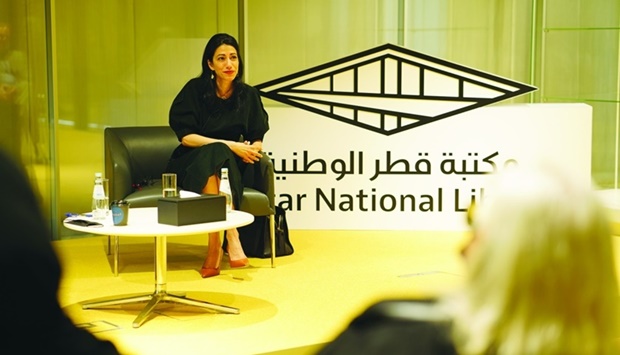Huma Abedin, long-time adviser to the former US secretary of state Hillary Clinton, has spoken about the importance of women supporting women – and of female friendship – in a talk at the Qatar National Library (QNL).
Abedin served as vice-chair for Clinton’s 2016 US presidential campaign, and speaking about her experience, she said: “Hillary [Clinton] has been both a mentor and a friend.”
“There are many people who sit at the top of institutions, who don’t want people at the table who are smarter than them, because it reveals their own insecurities,” she said. “(Clinton) was exactly the opposite – she wanted everyone at the table to be smarter than her.”
“She thought, and believed, that is how you get things done. She’s a problem solver by nature,” Abedin continued. “‘Hillaryland’ [the nickname for Clinton’s political operation] was a culture where it was about, ‘How do we do this better?’, ‘How are we more successful?’, ‘How do I help you write this speech?’, ‘How is your mother?’, ‘You should talk to my allergist’.”
“‘Hillaryland’ was all of these things, because Hillary Clinton was all of these things,” she continued. “As women climbed up the ladder of success, in this world you did not step on the fingers of the women below you – it was all about pulling them up.”
Abedin told the event about her experiences in Qatar, saying: “I’m in a country that has phenomenal women leaders. I’m constantly speechless when I walk out of rooms with them.”
Explaining how her journey – and her success – began, she spoke about how her grandmother was born in early 1900s, in India, in a world where girls were expected to stay at home.
“Every moment that I’ve had, every time I’ve stopped at Buckingham Palace or flown on Air Force One or been in these incredible spaces and places, I credit my grandmother who, at eight years old, woke up one day and demanded to go to school, demanded to be educated,” Abedin said.
“She cut a deal with her parents to go to school. And I credit everything in my life to that eight-year-old girl, who seemed to believe – I don’t know how or why – that if she was educated, it would change her life and her family’s life,” she said. “And it certainly did.”
Abedin also spoke about her life growing up in Saudi Arabia to Indian and Pakistani parents, and as a Muslim woman.
“I say this with a tremendous amount of humility: I wake up every day to some message on Instagram, or an e-mail, or a text message, from a young women or young person, saying ‘if you can do this, maybe I can’,” she said. “Occupy those rooms, be in those spaces, step up, run for office, speak publicly, go on TV. Don’t just be put in a box.”
The talk moderated by Dr Amal Mohamed al-Malki, founding dean of the College of Humanities and Social Sciences at Hamad Bin Khalifa University, part of Qatar Foundation, was held as part of Abedin’s book tour for her memoir *Both/And.
Abedin served as vice-chair for Clinton’s 2016 US presidential campaign, and speaking about her experience, she said: “Hillary [Clinton] has been both a mentor and a friend.”
“There are many people who sit at the top of institutions, who don’t want people at the table who are smarter than them, because it reveals their own insecurities,” she said. “(Clinton) was exactly the opposite – she wanted everyone at the table to be smarter than her.”
“She thought, and believed, that is how you get things done. She’s a problem solver by nature,” Abedin continued. “‘Hillaryland’ [the nickname for Clinton’s political operation] was a culture where it was about, ‘How do we do this better?’, ‘How are we more successful?’, ‘How do I help you write this speech?’, ‘How is your mother?’, ‘You should talk to my allergist’.”
“‘Hillaryland’ was all of these things, because Hillary Clinton was all of these things,” she continued. “As women climbed up the ladder of success, in this world you did not step on the fingers of the women below you – it was all about pulling them up.”
Abedin told the event about her experiences in Qatar, saying: “I’m in a country that has phenomenal women leaders. I’m constantly speechless when I walk out of rooms with them.”
Explaining how her journey – and her success – began, she spoke about how her grandmother was born in early 1900s, in India, in a world where girls were expected to stay at home.
“Every moment that I’ve had, every time I’ve stopped at Buckingham Palace or flown on Air Force One or been in these incredible spaces and places, I credit my grandmother who, at eight years old, woke up one day and demanded to go to school, demanded to be educated,” Abedin said.
“She cut a deal with her parents to go to school. And I credit everything in my life to that eight-year-old girl, who seemed to believe – I don’t know how or why – that if she was educated, it would change her life and her family’s life,” she said. “And it certainly did.”
Abedin also spoke about her life growing up in Saudi Arabia to Indian and Pakistani parents, and as a Muslim woman.
“I say this with a tremendous amount of humility: I wake up every day to some message on Instagram, or an e-mail, or a text message, from a young women or young person, saying ‘if you can do this, maybe I can’,” she said. “Occupy those rooms, be in those spaces, step up, run for office, speak publicly, go on TV. Don’t just be put in a box.”
The talk moderated by Dr Amal Mohamed al-Malki, founding dean of the College of Humanities and Social Sciences at Hamad Bin Khalifa University, part of Qatar Foundation, was held as part of Abedin’s book tour for her memoir *Both/And.

